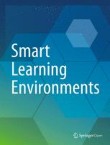Smart Learning Environments welcomes submissions to the thematic series on Smart Environments and Analytics on Video-Based Learning. Articles published in this special issue will present current, state-of-art research and critical thinking, designed to equip scholars and practitioners with the necessary knowledge in the specific area of the use and impacts of Videos in Learning.
With the widespread adoption of video-based learning systems such as Khan Academy and edX, new research in the area of Learning Analytics and Smart Learning Environments has emerged. Even new for-profit companies, such as Coursera and Udacity, have started offering forms of instruction that are primarily video-based. Most universities are implementing video lectures in a variety of ways, such as delivering lecture recordings before class to conserve class time or to flip the day for hands-on activities. Video-based learning environments (such as Massive Open Online Courses MOOCs) are becoming widely popular, sometimes with unjustified promises. Yet, the educational added-value of video-based learning environments, is lacking strong evidences, as learners do not always use them as expected and in an effective way.
To explore the future of smart environments and analytics related to video-based technologies for teaching and learning, we aim to collect high quality scholarly papers around this topical area, to envision what the next generation of video-based learning environments might look like.
Potential topics include, but are not limited to:
- design issues for video learning tools
- big data obtained from video learning systems
- instructional video capturing, editing, and sharing
- mobile-based (tablet, smart-phone) video learning
- participatory video-based course development
- infrastructure and technological issues with video learning
- various cultural uses of video learning systems
- the role of video in the flipped classroom
- user modeling, adaptation and personalization
- usability and interaction design
- pedagogy in massive online open courses (MOOCs)
Submission instructions:
Before submitting your manuscript, please ensure you have carefully read the Instructions for Authors for Smart Learning Environments. The complete manuscript should be submitted through the Smart Learning Environments submission system. To ensure that you submit to the correct thematic series please select the appropriate thematic series in the drop-down menu upon submission. In addition, indicate within your cover letter that you wish your manuscript to be considered as part of the thematic series on Smart Environments and Analytics on Video-Based Learning. All submissions will undergo rigorous peer review and accepted articles will be published within the journal as a collection.
The article processing charge (APC) for all submissions to this thematic series will be covered by Beijing Normal University, therefore authors will not need to pay the APC. Authors wishing to submit to this thematic series should contact Prof. Kinshuk (kinshuk@ieee.org) to obtain a membership code, which must be entered during submission (3rd payment option) in order to waive the APC for their submission.
Deadline for submissions: 15 December, 2015
Lead guest editor:
Michail N. Giannakos, Norwegian University of Science and Technology
Guest editors:
Demetrios G. Sampson, University of Piraeus & CERTH
Łukasz Kidziński, École Polytechnique Fédérale de Lausanne
Submissions will also benefit from the usual advantages of open access publication:
- Rapid publication: Online submission, electronic peer review and production make the process of publishing your article simple and efficient
- High visibility and international readership in your field: Open access publication ensures high visibility and maximum exposure for your work - anyone with online access can read your article
- No space constraints: Publishing online means unlimited space for figures, extensive data and video footage
- Authors retain copyright, licensing the article under a Creative Commons license: articles can be freely redistributed and reused as long as the article is correctly attributed
For editorial enquiries please contact editorial@slejournal.com.
Sign up for article alerts to keep updated on articles published in Smart Learning Environments - including articles published in this thematic series!
